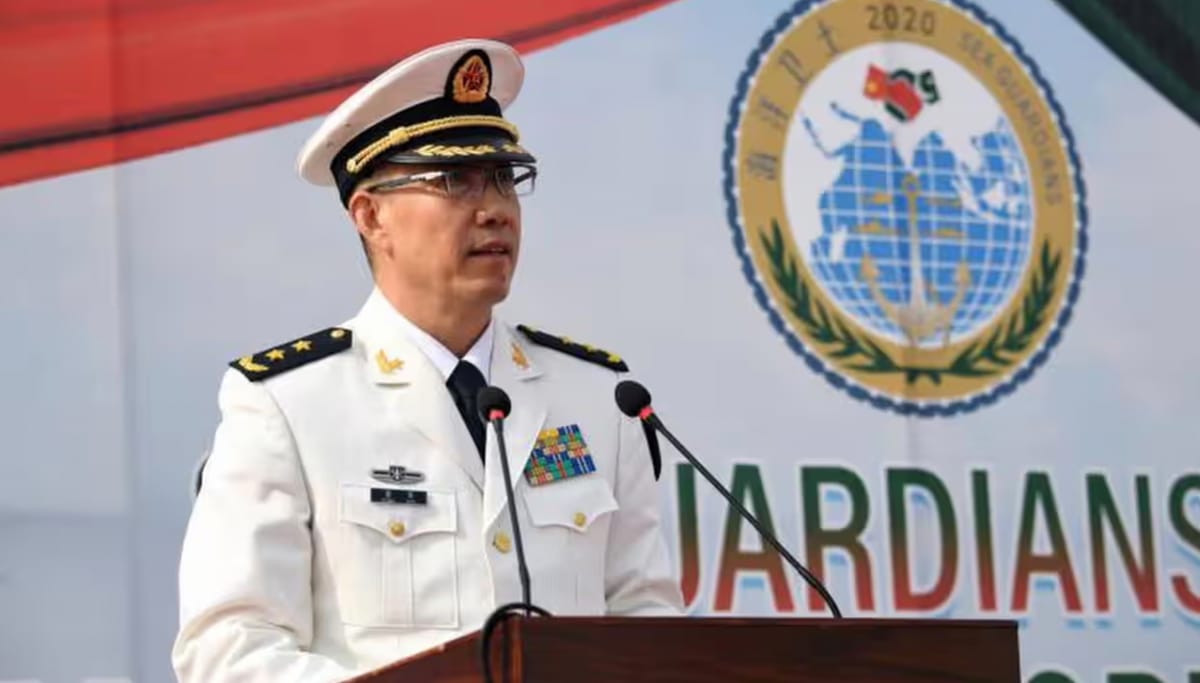China's New Defense Minister Raises Chances of U.S. Military Talks

The Lede: Last Friday, China named navy veteran Dong Jun as the new defense minister. This move could help China and the U.S. resume high-level military talks and stabilize the security conditions between the rival superpowers.
What We Know:
- After months of speculation following the ousting of former defense minister Li Shangfu, China closed the year with an announcement of Dong Jun’s appointment to the position. Dong is the first defense minister from a naval background with previous experience as former vice commander of the Southern Theater Command, which patrols the disputed South China Sea. The appointment follows a series of personnel purges of Chinese military and related posts over the past year.
- Dong’s predecessor Li Shangfu was not allowed by Beijing to have direct contact with U.S. Defense Secretary Lloyd Austin due to sanctions placed on him by the U.S. Treasury Department. Pentagon spokesperson John Supple said on Tuesday that contact between the two defense chiefs would take time to organize and that planning has begun for the bilateral Defense Policy Coordination Talks (DPCT) and Military Maritime Consultative Agreement (MMCA) to resume.
The Background: China’s previous defense minister Li had been prevented from meeting with U.S. Defense Secretary Lloyd Austin as Beijing protested Washington’s sanctions on him. Austin’s invitations to meet and to speak on the phone were rejected during Li’s tenure. Li abruptly disappeared and was removed as defense minister in August without explanation. Chinese President Xi Jinping and U.S. President Joe Biden pledged to resume high-level military talks during their meeting on the sidelines of APEC last month in San Francisco. The Defense Policy Coordination Talks (DPCT) is a staff-level military-to-military dialogue typically led by a U.S. deputy assistant secretary of defense and a Chinese major general. China cancelled DPCT talks in August 2022 in protest of then-House Speaker Nancy Pelosi’s visit to Taiwan.. The Military Maritime Consultative Agreement (MMCA) provides an operator-level exchange for U.S. and Chinese militaries to discuss issues of maritime safety.
Likely Outcomes:
- With the most glaring hiccup resolved for the Chinese military chief position, there may be an introductory call or meeting between Dong and Austin in the near future. If both sides approach military to military dialogue in good faith, Washington and Beijing may smooth out some of the turbulence in Indo-Pacific security matters with exchanges and assurances in respective security viewpoints.
- The two superpowers still have critical dilemmas such as in the disputed South China Sea, Taiwan, and North Korea among others. These will not be easily agreed upon and significant shifts in the status quo may trigger a serious crisis between the U.S. and China. Both sides likely hope to cooperate in at least mitigating these risks through dialogue and establishing clearer red lines.
Quotables:
“The appointment of two naval officers at these key posts, especially defense minister, strongly suggests two things: the navy is regarded as the most loyal service to Xi; and it’s also the one that combines technical and professional knowledge with the aims of keeping China projecting power in its immediate periphery.” – Alessio Patalano, professor of war and strategy at King’s College
“That gives him more confidence when we bring up a litany of issues and concerns related to the South China Sea and Taiwan Straits — he’s able to speak authoritatively [by saying] ‘I commanded the Navy, I know how these interactions go down, know the stakes involved and the potential for accidents.’” – Lyle Morris, fellow at the Asia Society Policy Institute’s Center for China Analysis
“Will Beijing actually pick up the phone, let alone place the first call? Unfortunately, China’s track record continues to suggest that the answer is ‘no,’ ‘not reliably,’ or at least ‘not right away.’” – Andrew Erickson, professor of strategy at the Naval War College’s China Maritime Studies Institute
"Given China's mounting domestic challenges, there's a noticeable shift towards a more pragmatic approach that seeks to balance economic development with national security." – Tong Zhao, senior fellow at the Carnegie Endowment for International Peace
"Genuine peace and stability in the Asia-Pacific would require a robust, across-the-board engagement agenda between the security establishments, encompassing coast guards, intelligence communities, and even space and nuclear strategic forces.” – Lyle Goldstein, director of the Asia Engagement program at Defense Priorities
Good Reads:
China Names New Defense Minister, Removing Block to US Talks (Bloomberg)
Looking for an opening with China’s new defense minister (Politico)
U.S. and China to resume staff-level military dialogue in January (Nikkei)
